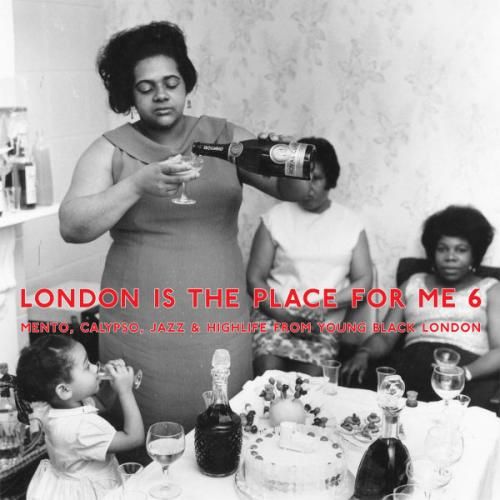When calypso arrived on the shores of the U.K.-- carried by Lord Kitchener as he crossed the Atlantic on the Empire Windrush--it started where it had left off in its native Trinidad. Its tradition of being a musical voice of the people to discuss, critique and protest the events of the day didn't miss a beat in England, literally beginning minutes after the Windrush had docked, as Lord Kitchener sang a few lines from "London is the Place for Me" for local broadcasters. While Kitchener would later sing of London less fondly, calypso -- and other styles like highlife, jazz, and mento -- continued to reflect the experience of the tens of thousands of emigres who traveled from the Caribbean and West Africa to England in search of work and better living conditions.
The musical output of this underconsidered period has been documented in the excellent London is the Place for Me series from Honest Jon's. Each installment has been carefully compiled not only with an ear for the period's best music, but also with truly close attention to the social context in which the music existed. On listening, what is revealed is a musical history lesson that not only showcases the talents of the "Windrush" artists, but depicts the complexities and hardships they faced, expressed, and interpreted through their music. In doing so, it becomes apparent that these songs were not simply entertainment. They were pieces of home, putting into words and song their experiences. They were an adhesive for the community.
With the sixth volume of the series, Honest Jon's delves into "Mento, Calypso, Jazz and Highlife from Young Black London" as the title states. Saxophonist King Timothy covers some of the popular topics of the day's youth in the humorous "Jiu Jitsu Calypso," detailing a girlfriend's obsession with practicing the martial art on him. On "Football Calypso," Timothy describes sitting in a bar alone before being approached by a group of soccer fans in an argumentative mood, while "Joe Louis Calypso" from Lord Beginner praises the black boxer's success. The Mighty Terror describes a homecoming celebration for the Queen, while "Life in Britain" channels Lord Kitchener's "London is the Place for Me" as Terror sings, "I am going to stay here in Great Britain to better my position." With each consecutive verse, Terror details a success story that starts in Trinidad and ends with a wife and a child in London.
Elsewhere the compilation delves into other popular styles of the time. "Mambo Contempo" from Ginger Johnson rollicks along with an upbeat Cubano flair. "Asikoloto" from the West African Rhythm Brothers is a fascinatingly laid-back offering that begins with an xylophone before transitioning into a highlife guitar solo midway through, seamlessly blending the various sounds of black London in less than three minutes. But the centerpiece and gem of the compilation may be a mento offering from Lili Verona. Under a slew of midtempo percussion and jazzy guitar, Verona describes with a sultry and endearing vocal the "big instrument" her boyfriend comes over with each night in order to "practice" on with her. Such playful, thinly veiled innuendo reveals itself as an almost direct precursor to the "slackness" that would follow decades later in dancehall, showcasing the influence mento had not only musically but thematically on reggae.
Such quotidian topics covered in these tracks may seem simplistic but they keep within calypso (and other style’s) long tradition of singing about the various going-ons and events of the time. And while the sixth installment of Honest Jon's offers mostly obscure cuts from period, there is still much to delve into here. Fifty years later we are left with a still vital historical relic, one in which the humor, fears and obsessions of the black Londoners who made up the Windrush generation are revealed through song.









